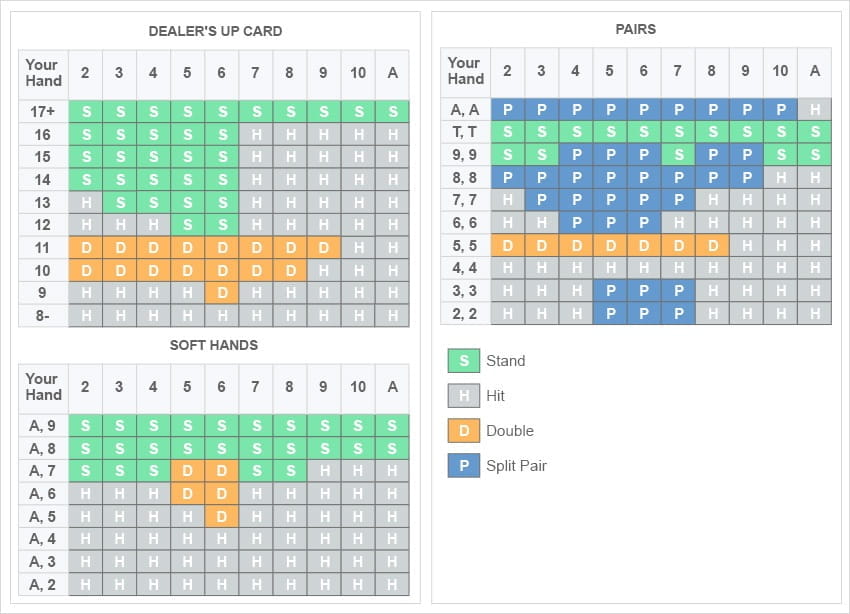Blackjack Odds Wiki
Even money is a wagering proposition with even odds - the bettor stands to lose or win the same amount of money. Beyond gambling, even money can mean an event whose occurrence is about as likely to occur as not. Even money is also known as 50–50.

Blackjack Strategy Wikihow
In professional gambling, even money bets typically do not have odds that are indeed 50–50. Therefore, successful gamblers have to examine any bets they make in light of the odds really being even money.[1] For example, in roulette, betting on red or black is an even money bet. However, the presence of the green 0 and the 00 means that statistically the bettor will lose more than 50% of the time. There are variations of the game that offer en prison on 37 number tables so if a 0 is rolled, the bettor neither wins or loses but his or her bet rides again on the next roll; if the bet-upon event occurs on the second spin, the even-money wager is returned to the bettor. There still is not a 50-50 chance of winning, but a lot closer, since the house edge is reduced by almost 50%.[2]
- For example, the house edge in blackjack is roughly 0.5%. If a player is offered a $100 cashable bonus requiring $5000 in wagering on blackjack with a house edge of 0.5%, the expected loss is $25. Therefore, the player has an expected gain of $75 after claiming the $100 bonus. A large portion of online casino disputes relate to bonuses.
- Counting cards in blackjack is tough, and though not illegal, it's frowned upon and can get you booted from casinos. But if you already have a firm grasp of the game, it's a great way to help you understand when the odds are in your favor.
- CONVERTING ODDS TO PROBABILITY. Probability to odds: Divide the probability by one minus that probability. Example: If the probability is 10% or 0.10, then the odds are 0.1/(1-0.1) = 0.1/0.9 = 1/9 or “1 to 9”. Odds to probability: Divide the odds by one plus the odds.

In blackjack, even money bet is a side bet offered to a player that has a natural (an Ace and a ten-valued card) in case the dealer has an Ace as a face-up card. This bet costs half the size of the original bet. Even money bet protects the player from a push if the dealer has a blackjack. In case the dealer does have a blackjack, the player will push on the original bet and get a 2 to 1 payout on the even money side bet. However if the dealer does not have a blackjack, the player will be paid 3 to 2 on the original bet and lose the even money bet. Mathematically, requesting 'even money' on a natural on a table that pays 3:2 for a natural is the same as an insurance bet since the 50% bonus is being used to buy the insurance.[3]

Blackjack Odds Wikipedia
References[edit]
Poker Odds Wikipedia

- ^'Poker, Gambling and Life, Caro on Gambling'. Archived from the original on 2007-03-07. Retrieved 2007-02-13.
- ^Roulette Systems?
- ^'Basic Blackjack Rules'. CasinoObserver.com. Retrieved 2013-03-01.

The most common variations of card counting in blackjack are based on statistical evidence that high cards (especially aces and 10s, and to a lesser extent 9s) benefit the player more than the dealer, while the low cards, (3s, 4s, 6s, and especially 5s, and to a lesser extent 2s and 7s) help the dealer while hurting the player.
Blackjack Odds With 16
Blackjack is a game that may look simple on the outside, but beneath the surface, you’ll find that it’s all about odds and making the correct mathematical decisions. It’s easy to let your intuition take over and base your decisions at the table on that. To be able to play perfectly and master blackjack, it is, however, crucial to understand what the odds are for every scenario you face and only base your decisions on those odds. It’s important to be aware of how the house is getting an edge in the game and what advantages us players have to our disposal, which can be used to lower the house edge.
In the following article, we’ll be covering the basics for the optimal blackjack strategy, known as basic strategy, which makes it possible to lower the house edge a great deal. We’ll take a look at how the house is getting its edge; what our own advantages are; give a few examples on the odds on certain outcomes and show you how basic strategy is applied at the tables. The goal is to create a good understanding of the importance of odds and how the use of basic strategy can help you improve your game when you’re playing for real money.